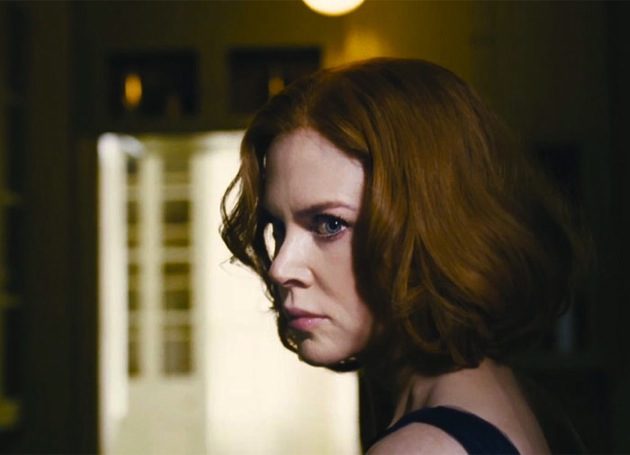SUNDANCE REVIEW: Splendidly Demented 'Stoker' Should Quench Park Chan-Wook Fans' Thirst

When South Korean genre iconoclast Park Chan-wook decided to bring his peculiar gifts to a Stateside production, anything could have happened — and anything pretty much does in Stoker, a splendidly demented gumbo of Hitchcock thriller, American Gothic fairy tale and a contemporary kink all Park's own. Led by a brilliant Mia Wasikowska as an introverted teenager whose personal and sexual awakening arrives with the unraveling of a macabre family mystery, this exquisitely designed and scored pic will bewilder as many viewers as it bewitches, making ancillary immortality a safer bet than Black Swan-style crossover biz for Fox Searchlight's marvelously mad March hare.
Earmarking future cult items is a fool's errand, but Park's film nonetheless stands to be treasured not just by his existing band of devotees, who should recognize enough of the Oldboy and Thirst director's loopy eroticism and singular mise-en-scene amid the studio gloss, but by epicurean horror buffs, camp aficionados and even a small, hip sect of post-Twilight youths.
Not all those auds will follow the stream of wink-wink storytelling references in the brazenly nasty script by Wentworth Miller, the British-born actor best known for his work in TV's Prison Break, here making his feature writing debut. None is more blatant than the naming of Matthew Goode's antagonist figure. When morbid-minded honor student India (Wasikowska) loses her beloved father, Richard (Dermot Mulroney), in an apparent freak car accident, the ink is barely dry on the death certificate when her globe-trotting uncle Charles (Goode, his unhurried charm and preppy handsomeness put to their best use since 2005's Match Point), whom she's never met before, arrives to stay.
Before you can say Shadow of a Doubt, this urbanely handsome "Uncle Charlie" is arousing India's suspicions (and, it's implied, other things besides) as he swiftly cements himself in the household by seducing her brittle, emotionally susceptible mother, Evelyn (Nicole Kidman). Shortly afterward, their housekeeper disappears without notice; ditto India's meddlesome aunt (a brief but tangy turn from Jacki Weaver), who appears to know troubling truths about the intruder, dismissed out of hand by Evelyn.
The is-he-or-isn't-he question is answered sooner than Hitch might have done it, as India's darkest instincts about Charles are confirmed by the end of the first half - though, unsurprisingly in this particular story world, this knowledge actually causes her to warm to him a little. (And only a little: when he mentions his desire to be friends, her typically pithy reply is, "We don't need to be friends, we're family.")
But there's still plenty of mileage in Miller's warped family melodrama, as the respective and inevitably linked uncertainties about Richard's death and Charlie's long absence are kept aloft, while Charlie's gradual playing of India and Evelyn against each other adds queasy sexual tension to an already chilly mother-daughter relationship. Auds will either go with this festering hotbed of secrets, lies and severed heads, or tune out early, and even the faithful may debate whether or not Park, who otherwise oversees proceedings with amused precision, overplays his hand in the bizarre, bloody finale.
Material this wild demands actors fully committed to the cause, and Park has found them, particularly in his two female leads. Kidman, here extending her commendable record of counterintuitive auteur collaboration, has such form in the area of passive-aggressive ice queens that her work here shouldn't surprise, but the performance gets more bravely unhinged as it goes along, culminating in a spectacular Mommie Dearest tirade against her daughter that seems ripe for future impressions. Still, it's Wasikowska's film, and she shoulders it with witty aplomb: equal parts Alice in Wonderland and Wednesday Addams, her India is in constant, silent argument with the world around her.
All the actors are given an invaluable assist from Kurt Swanson and Bart Mueller's crisply tailored costumes, which are period-indeterminate even as the film is set in the present day. This kind of chic otherness is also at play in Therese De Prez's superb production design: the Stoker family house, all angular architectural fittings and inventively distorted scale, is a creation worthy of prime Tim Burton.
Park's regular d.p. Chung-hoon Chung appears to be channeling photographer Gregory Crewdson's eerily high-key Americana in his lighting schemes, while Clint Mansell's characteristically rich, modernist score is embellished with haunting piano duets composed specifically for the film by Philip Glass. The repeated use of the Lee Hazlewood/Nancy Sinatra number "Summer Wine," meanwhile, is typical of the director's cockeyed take on American culture. Long may he continue to explore.
